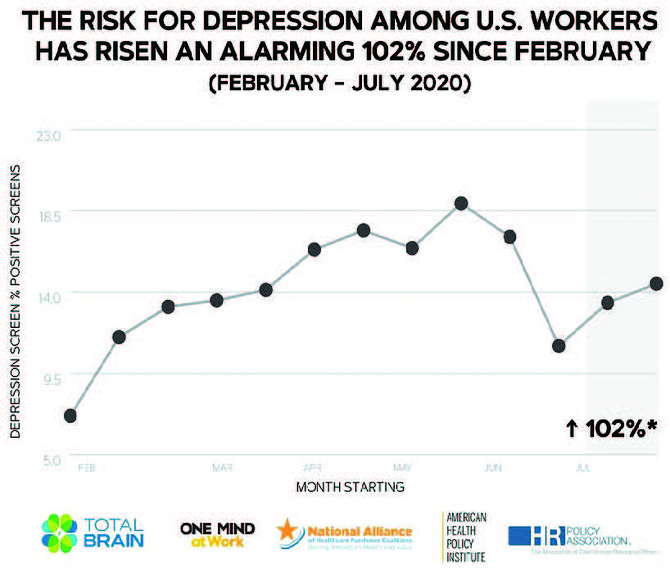102% Upsurge in Risk for Depression Among U.S. Workers Since February
102% Upsurge in Risk for Depression Among U.S. Workers Since February
The risk for depression among U.S. workers has risen an alarming 102% since February, according to findings from the Mental Health Index. The escalating threat of developing a depressive mood disorder shows little sign of abating. Between June and July, the risk of depression climbed a staggering 31%.
The Mental Health Index: U.S. Worker Edition, powered by Total Brain, a leading mental health and brain performance self-monitoring and self-care platform, is distributed in partnership with the National Alliance of Healthcare Purchaser Coalitions, One Mind at Work, and the newest coalition members, the HR Policy Association and its American Health Policy Institute.
Additional findings from Total Brain’s clinically-validated brain assessments show millennials are among the most emotionally vulnerable groups in the COVID-19 era. Working Americans ages 20-39 have a:
101% higher risk of depression and a 132% greater risk of general anxiety disorder than their middle-aged counterparts (ages 40-59); and a
305% higher risk of depression than their baby boomer colleagues (ages 60+).
These findings come on the heels of new CDC data revealing one in four young adults say they have considered suicide in the past month because of the coronavirus.
“It has been more than five months since the WHO declared COVID-19 a pandemic,” noted Louis Gagnon, CEO, Total Brain. “People are experiencing sustained elevation in stress and anxiety levels like never before. The fact that the risk of developing clinical depression continues to escalate at such a disturbing rate comes as little surprise. Depression is the manifestation of months of chronic stress and anxiety overload.”
“COVID-19 is only accelerating an already alarming mental health crisis in the U.S.,” said Chuck Columbus, CEO, American Health Policy Institute. “Findings from the Mental Health Index underscore the need to boldly rethink the delivery of behavioral health services. We are excited to join this collaboration and support such an important and relevant issue.”
Garen Staglin, chairman of One Mind at Work, commented, “The most recent data shows the increasing urgency for employers to take seriously the mental health of their workforce. The significant increase in risk for depression among millennials is a reminder that those in their late 20s and 30s are experiencing even more adverse mental health effects from the pandemic than other age ranges. Workplaces have unique opportunities to support their employees’ wellbeing and we hope this data is a catalyst for more action.”
“With the resurgence of the virus in July, it is clear that we will not be getting back to normal any time soon,” said Michael Thompson, president, and CEO, National Alliance. “That realization has led to a surge in people with depression, particularly in our younger population.”
The full Mental Health Index results can be found at: https://www.totalbrain.com/mentalhealthindex
Latest Stories
- Southern Illinois University Carbondale to Present Chancellor’s Scholarship at Rich Township High School District 227
- OLIVE -HARVEY COLLEGE JUSTICE CENTER SHORT FILM FESTIVAL
- STATE, COUNTY, AND LOCAL LEADERS TO TRAVEL TO PROVISO EAST HIGH SCHOOL TO HONOR STUDENTS FOR REMARKABLE TURNAROUND
- Let’s Just Do It
- The Ripple Effect Tour Aims To Create Waves Of Change
Latest Podcast
Bren Sheriff-"Get Your House In Order"

